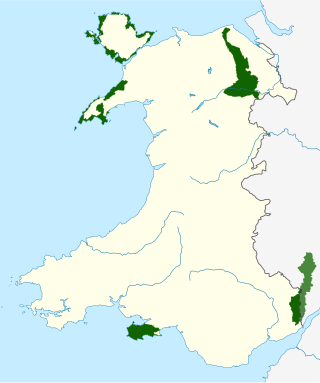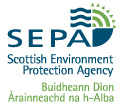
The Countryside Council for Wales was a Welsh Assembly sponsored body responsible for wildlife conservation, landscape and countryside access authority of Wales.

There are five Areas of Outstanding Natural Beauty (AONBs) in Wales. AONBs are areas of countryside that have been designated for statutory protection, due to their significant landscape value, by initially the Government of the United Kingdom and later Welsh devolved bodies. Of the current five areas designated, four are wholly in Wales, with another spanning the Wales-England border, and in total AONBs account for 4% of Wales' land area.

The Common Agricultural Policy (CAP) is the agricultural policy of the European Union. It implements a system of agricultural subsidies and other programmes. It was introduced in 1962 and has since then undergone several changes to reduce the EEC budget cost and consider rural development in its aims. It has, however, been criticised on the grounds of its cost and its environmental and humanitarian effects.

Conservation agriculture (CA) can be defined by a statement given by the Food and Agriculture Organization of the United Nations as "Conservation Agriculture (CA) is a farming system that can prevent losses of arable land while regenerating degraded lands.It promotes minimum soil disturbance, maintenance of a permanent soil cover, and diversification of plant species. It enhances biodiversity and natural biological processes above and below the ground surface, which contribute to increased water and nutrient use efficiency and to improved and sustained crop production."
The Countryside Stewardship Scheme was originally an agri-environment scheme run by the United Kingdom Government set up in 1991. In its original form it expired in 2014. It was relaunched for the Rural Development Programme England (RDPE) 2014-2020 with £3.1bn of government subsidy for agriculture and forestry, replacing the previous Environmental Stewardship scheme.
Environmental Stewardship is an agri-environment scheme run by the Department for Environment, Food and Rural Affairs in England which aims to secure widespread environmental benefits. It was formally launched on 18 March 2005, although the first agreements did not start until 1 August 2005.
England Rural Development Programme is the instrument by which the UK Department for Environment, Food and Rural Affairs (Defra) fulfills its rural development obligations in England, as set out by the European Union. It is derived primarily from Council Regulation European Union Regulation No. 1257/1999 and the related successive implementing Commission Regulations.

The Rural Payments Agency (RPA) is an executive agency of the UK Department for Environment, Food and Rural Affairs (Defra). Prior to Brexit, the RPA delivered the European Union (EU) Common Agricultural Policy (CAP) payments to farmers and traders in England, paying out over £2 billion in subsidies each year. The Agency managing more than 40 schemes, the largest of which the Basic Payment Scheme (BPS) paying more than £1.5 billion to around 105,000 claimants a year.
An environmental management scheme is a mechanism by which landowners and other individuals and bodies responsible for land management can be incentivised to manage their environment.

The Scottish Environment Protection Agency is Scotland's environmental regulator and national flood forecasting, flood warning and strategic flood risk management authority. Its main role is to protect and improve Scotland's environment. SEPA does this by helping business and industry to understand their environmental responsibilities, enabling customers to comply with legislation and good practice and to realise the economic benefits of good environmental practice. One of the ways SEPA does this is through the NetRegs environmental guidance service. It protects communities by regulating activities that can cause harmful pollution and by monitoring the quality of Scotland's air, land and water. The regulations it implements also cover the storage, transport and disposal of radioactive materials.

Environment Agency Wales was a Welsh Government sponsored body that was part of the Environment Agency of England and Wales from 1996 to 2013. Its principal aims were to protect and improve the environment in Wales and to promote sustainable development. On 1 April 2013 the organisation was merged with the Countryside Council for Wales and Forestry Commission Wales into a single environmental body, Natural Resources Wales.
On 26 June 2003, EU farm ministers adopted a fundamental reform of the Common Agricultural Policy (CAP) and introduced a new Single Payment Scheme for direct subsidy payments to landowners.
The Natural Heritage Trust (NHT), or National Heritage Trust Account was set up in 1997 by means of the Natural Heritage Trust of Australia Act 1997, with the main objective of conserving the "natural capital infrastructure" of Australia. Money from the NHT Account must be spent on the environment, sustainable agriculture and natural resources management (NRM). Since its establishment, a considerable number of community groups and organisations have received funding for environmental and natural resource management projects, delivered via a number of different initiatives since 1997. As of June 2020, the NHT account is funding a program known as Phase Two of the National Landcare Program. The original National Landcare Program was launched in 1992, but in 2014 merged with the Caring for our Country program.

The Environment Protection and Biodiversity Conservation Act 1999(Cth) is an Act of the Parliament of Australia that provides a framework for protection of the Australian environment, including its biodiversity and its natural and culturally significant places. Enacted on 17 July 2000, it established a range of processes to help protect and promote the recovery of threatened species and ecological communities, and preserve significant places from decline. The Act is as of June 2020 administered by the Department of Agriculture, Water and the Environment. Lists of threatened species are drawn up under the Act, and these lists, the primary reference to threatened species in Australia, are available online through the Species Profile and Threats Database (SPRAT).
Tir Cymen was an environmental and preservation programme in Wales to preserve representative examples of the Welsh landscape. It started in 1992 and new nominations were closed in 1998.

Hill farming or terrace farming is an extensive farming in upland areas, primarily rearing sheep, although historically cattle were often reared extensively in upland areas. Fell farming is the farming of fells, a fell being an area of uncultivated high ground used as common grazing. It is a term commonly used in Northern England, especially in the Lake District and the Pennine Dales. Elsewhere, the terms hill farming or pastoral farming are more commonly used.

Natural Resources Wales is a Welsh Government sponsored body, which became operational from 1 April 2013, when it took over the management of the natural resources of Wales. It was formed from a merger of the Countryside Council for Wales, Environment Agency Wales, and the Forestry Commission Wales, and also assumed some other roles formerly performed by the Welsh Government.
Low-impact development (LID) has been defined as "development which through its low negative environmental impact either enhances or does not significantly diminish environmental quality".

Agriculture in Wales has in the past been a major part of the economy of Wales, a largely rural country that forms part of the United Kingdom. Wales is mountainous and has a mild, wet climate. This results in only a small proportion of the land area being suitable for arable cropping, but grass for the grazing of livestock is present in abundance. As a proportion of the national economy, the importance of agriculture has become much reduced; a high proportion of the population now live in the towns and cities in the south of the country and tourism has become an important form of income in the countryside and on the coast. Arable cropping is limited to the flatter parts and elsewhere dairying and livestock farming predominate.
Glastir is a sustainable land management scheme in Wales launched by the Welsh Assembly Government in 2012. Its goals include "combating climate change, improving water management and maintaining and enhancing biodiversity." It aims to "deliver measurable outcomes at both a farm and landscape level in a cost effective way". The scheme is funded by the Welsh Government and the European Union.











